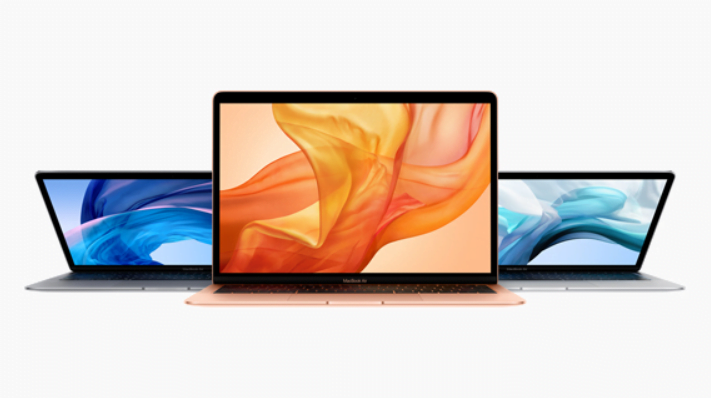The MacBook Air upgrade that people have been waiting for is finally here. Apple unveiled the new MacBook Air in New York on Tuesday. It has a better display, a faster processor, a Touch ID fingerprint sensor that lets you unlock it with your fingerprint, and the third-generation butterfly keyboard. Thankfully, it doesn’t have the Touch Bar controls. It also gets a T2 chip that makes it far more difficult for hackers or government agencies to eavesdrop or hack into your device.
T2 chip dramatically improves data security
Under the hood, the new MacBook Air features Intel’s latest Core i5 Y-series chip and storage options going all the way up to 1.5TB SSDs. The trackpad is larger than the previous generation. Apple claims it has a battery life of up to 13 hours on a single charge. It has two Thunderbolt ports. Apple hasn’t added a touchscreen to the new MacBook Air, though.
Apple said at the event that it has integrated the T2 security chip in the new MacBook Air as well. It improves data security by carrying out a whole lot of background tasks. It ensures that the integrity of the solid state drive (SSD) storage isn’t compromised. Even if someone with malicious intent removes your MacBook Air’s SSD and tries to access your data through another device, they are going to be disappointed. The T2 chip proves really useful for business users, who want an extra layer of protection for their data.
For the uninitiated, T2 is a secure co-processor integrated into the latest MacBook Air as well as the recent MacBook Pros and iMac Pros. It works independently of the main processor, and is used to handle encryption-related operations. On Macs, it also handles the Touch ID authentication, the APFS encryption storage system, and the secure boot process.
The hardware disconnect feature in the new MacBook Air
The built-in T2 chip will also automatically disconnect the microphone at the hardware level when you close the new MacBook Air’s lid. It is meant to prevent an app or malware from secretly recording your conversations. Apple said in a white paper that the hardware disconnect feature in the T2 chip “ensures that the microphone is disabled whenever the lid is closed.” However, the hardware-level disconnect is available only to “Apple portables” because the iMacs don’t have lids.
The hardware disconnect feature was added to the new MacBook Air first. It wasn’t mentioned in Apple’s January white paper on the T2 chip or materials released this summer. Apple could bring hardware disconnect to the T2-capable MacBook Pros via a software update in the near future. Apple says in its white paper that the disconnect is implemented in hardware alone. So, it “prevents any software, even with root or kernel privileges in macOS, and even the software on the T2 chip, from engaging the microphone when the lid is closed.”
When the lid is open, the user has to rely on antivirus programs such as OverSight that notify you when a program or app attempts to access your Mac’s microphone or camera. It means the T2 chip can minimize the risk of hacking, snooping, and eavesdropping, but you are still vulnerable to malicious attacks. Also, the camera isn’t disconnected because its “field of view is completely obstructed with the lid close.”
For a long time, people believed that the Mac webcams had a hardware-connected light, which should make it impossible to activate the webcam without the user’s knowledge. But hackers have been tapping into the webcams to spy on their targets for years. Last year, security researcher Patrick Wardle discovered the Fruitfly malware that shocked the world. British spy agency has been tapping into webcams of their targets for years under their ‘Optic Nerve’ program.
The new MacBook Air starts at $1,199 for the base model, making it far more expensive than the original $999 MacBook Air. It’s not the “affordable” MacBook that consumers were expecting. The biggest competitor of the new MacBook Air is not the 12-inch MacBook or the more expensive MacBook Pros, but the newly announced iPad Pros.





